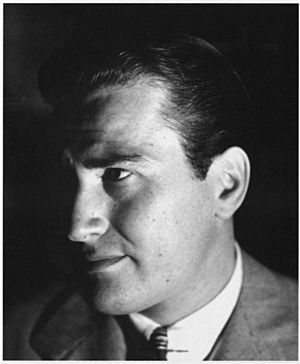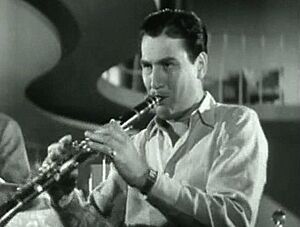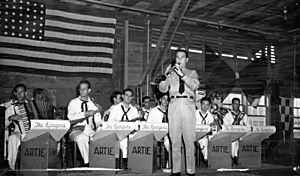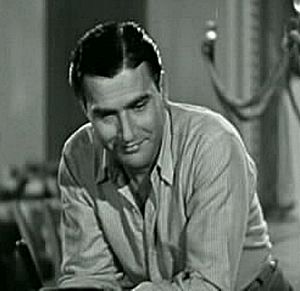Artie Shaw facts for kids
Quick facts for kids
Artie Shaw
|
|
|---|---|

Shaw c. 1947
|
|
| Background information | |
| Birth name | Arthur Jacob Arshawsky |
| Born | May 23, 1910 New York City, U.S. |
| Died | December 30, 2004 (aged 94) Thousand Oaks, California, U.S. |
| Genres |
|
| Occupation(s) |
|
| Instruments | Clarinet, Saxophone |
| Years active | 1925–1954 |
Artie Shaw (born Arthur Jacob Arshawsky; May 23, 1910 – December 30, 2004) was a famous American musician. He played the clarinet, wrote music, and led popular bands. He was also an actor and wrote books.
Many people thought Artie Shaw was one of the best clarinet players in jazz music. He led one of the most popular big bands in the United States from the late 1930s to the early 1940s. He had many hit songs, but he was most famous for his 1938 recording of "Begin the Beguine" by Cole Porter. This song made him a huge pop star very quickly.
Shaw also played with smaller jazz groups. He served in the U.S. Navy from 1942 to 1944. During this time, he led a band that played for soldiers in the South Pacific to boost their spirits. After the war, he continued to lead a band until 1945. He then started focusing on other interests and slowly stopped being a professional musician. He fully retired from music in 1954.
Contents
Artie Shaw's Early Life
Arthur Jacob Arshawsky was born on May 23, 1910, in New York City. His parents were Sarah and Harold "Harry" Arshawsky. His family was Jewish, and his father was from Russia, while his mother was from Austria.
Artie grew up in New Haven, Connecticut. He was a quiet person, and he faced challenges because he was Jewish. He bought a saxophone by working in a grocery store and started learning to play it at age 13. When he was 16, he switched to the clarinet and left home to travel with a band.
Artie Shaw's Music Career
When Artie Shaw returned to New York, he became a session musician, playing for many bands and orchestras in the early 1930s. From 1926 to 1929, he worked in Cleveland. He became known as a great music director and arranger for an orchestra led by violinist Austin Wylie.
In 1929 and 1930, he played with Irving Aaronson's Commanders. This experience introduced him to symphonic music, which he later used in his own arrangements. In 1932, Shaw joined the Roger Wolfe Kahn Orchestra. He made several recordings with them, including "It Don't Mean a Thing (If It Ain't Got That Swing)".
Leading His Own Bands
In 1935, Artie Shaw first got noticed with his song "Interlude in B-flat" at a swing concert in New York. During the swing era, his big bands were very popular. They had hits like "Begin the Beguine" (1938), "Stardust", "Back Bay Shuffle", "Moonglow", "Rosalie", and "Frenesi".
Shaw was an innovator in the big band style. He used unusual instruments in his music. For example, in "Interlude in B-flat," he was backed by only a rhythm section and a string quartet. This was an early example of what later became known as Third Stream music, which mixes classical and jazz styles. He was inspired by the classical composer Igor Stravinsky to use string instruments.
In 1938, Artie Shaw hired Billie Holiday as his band's singer. He was the first white bandleader to hire a full-time Black female singer to tour the segregated Southern U.S. However, Billie Holiday left the band because of difficulties from audiences in the South. Music company executives also wanted a more "mainstream" singer.
Like his main rival, Benny Goodman, Shaw created a smaller "band within the band" in 1940. He called it Artie Shaw and the Gramercy Five. This group's biggest hit was "Summit Ridge Drive." Shaw often formed bands, made records, and then broke them up quickly. He usually did not stay long enough to perform his hit songs live very often.
Radio and Disillusionment
Artie Shaw often performed on radio broadcasts. In 1938 and 1939, he was frequently heard from the Hotel Lincoln in New York City. He also led the house band at the Café Rouge of the Hotel Pennsylvania. He was the main star of a radio show with comedian Robert Benchley.
Shaw became tired of not having time to create new music. He also disliked playing the same popular songs over and over. He once said, "'Begin the Beguine' is a nice tune. But not when you have to play it 500 nights in a row." Because of his frustration, he walked off the bandstand during a live radio show and quit the band two days later. He went to Mexico for a break.
After returning from Mexico in 1940, Shaw experimented with combining strings and woodwinds with a jazz band in Hollywood. This led to the hit song "Frenesi." He was then hired to lead the band for the Burns and Allen Show radio program. He added six violins, two violas, and one cello to his big band. This gave him more musical options and allowed him to focus on slower songs.
Shaw disliked the celebrity lifestyle and the pressures from music companies. He felt his job was to play music, not to deal with the "business" side of it. He believed in playing good music, even if it wasn't always the most popular. He once told his agents that he was leaving the big band. They warned him he had contracts worth a million dollars. Shaw replied, "Tell 'em I'm insane. A nice, young American boy walking away from a million dollars, wouldn't you call that insane?"
In December 1941, while on tour, Shaw heard about the Attack on Pearl Harbor. He was deeply affected by the news. He decided to join the Navy, telling his band members that he was giving them two weeks' notice.
War Service and Later Years
During World War II, Artie Shaw joined the United States Navy. He formed a band that played for Navy personnel in the Pacific. He performed many concerts a day, even in battle zones. After 18 months, he returned to the U.S. feeling very tired and received a medical discharge. After the war, the popularity of big bands decreased as other music styles became more popular.
Shaw said his time in the Navy helped him think deeply about his life. After his discharge, he started therapy and began to focus on writing. His autobiography, The Trouble With Cinderella, was published in 1952. In it, he explained that "the trouble with Cinderella" is that "nobody ever lives happily ever after." He also wrote short stories and novels.
In 1954, Shaw went on a short tour in Australia. After that tour, he stopped playing the clarinet. He said he was a perfectionist and felt he had taken the clarinet as far as anyone could go. He spent the rest of the 1950s living in Europe.
In 1983, Artie Shaw, at age 73, organized a new band. He chose clarinetist Dick Johnson to lead the band and play the clarinet solos. Shaw's music library had many arrangements by famous composers. Shaw rehearsed his new band, which debuted on New Year's Eve 1984. Shaw appeared with the band for a few years, conducting but not playing the clarinet. By 1987, he no longer toured but would sometimes show up to listen.
Films and Television
Artie Shaw made several short musical films in 1939. He played himself in the Fred Astaire movie, Second Chorus (1940). In this film, Shaw and his orchestra played his "Concerto for Clarinet." The movie earned him two Oscar nominations. He also helped with the song "If It's You" in the Marx Brothers' film The Big Store (1941).
Many of his recordings have been used in movies. His 1940 recording of "Stardust" was used in The Man Who Fell to Earth. Director Martin Scorsese used Shaw's theme song, "Nightmare," in his movie The Aviator.
A Canadian filmmaker, Brigitte Berman, made an Academy Award-winning documentary about him called Artie Shaw: Time Is All You've Got (1985). It included many interviews with Shaw and other musicians. In 2000, filmmaker Ken Burns interviewed Shaw for his PBS documentary series Jazz. Shaw's last major interview was in 2003 for a BBC documentary.
Artie Shaw's Personal Life
Artie Shaw described himself as a "very difficult man." He was married eight times. His wives included famous actresses Lana Turner and Ava Gardner. He had two sons, Steven Kern and Jonathan Shaw.
Besides music, Shaw loved learning and reading. During his breaks from music, he studied advanced mathematics and literature.
In 1953, Shaw had to testify before the House Un-American Activities Committee. This committee was investigating people thought to have connections to communism. Shaw was questioned because of his involvement with a peace activist group.
Shaw was also a skilled marksman, ranking fourth in the U.S. in 1962. He was also an expert fly fisherman. In his later years, Shaw lived in Thousand Oaks, California. He passed away on December 30, 2004, at the age of 94. He had been ill for some time and had diabetes since the 1980s.
In 2005, his eighth wife, Evelyn Keyes, sued for part of his estate. In 2006, a jury decided she was entitled to almost half of his estate, which was $1,420,000.
Awards and Honors
In 1980, Artie Shaw gave his papers and music library, which included over 700 music scores, to Boston University. In 1991, this collection was moved to the University of Arizona. In 2004, he received a Grammy Lifetime Achievement Award.
In 1938, readers of DownBeat magazine voted Artie Shaw's band the best swing band.
Fans called Artie Shaw the "King of the Clarinet," while Benny Goodman was called the "King of Swing." Shaw felt the titles should be switched. He famously said, "Benny Goodman played clarinet. I played music."
Duke Ellington's longtime clarinet player, Barney Bigard, said Artie Shaw was his favorite clarinet player.
Selected Discography
| Year | Title | Peak pos. |
|---|---|---|
| US | ||
| 1936 | There's Frost On The Moon | 10 |
| 1937 | All God's Chillun Got Rhythm | 15 |
| Free Wheeling | 13 | |
| Love Is Good For Anything That Ails You | 20 | |
| Love And Learn | 11 | |
| 1938 | Back Bay Shuffle | 8 |
| Begin The Beguine | 1 | |
| Deep In A Dream | 3 | |
| Goodnight, Angel | 2 | |
| I Have Eyes | 10 | |
| Indian Love Call | 6 | |
| Let 'Er Go | 12 | |
| Nightmare | 7 | |
| One Song | 15 | |
| They Say | 1 | |
| 1939 | Between A Kiss And A Sigh | 13 |
| Comes Love | 4 | |
| Day In, Day Out | 11 | |
| Deep Purple | 17 | |
| Delightful Delirium | 15 | |
| I Poured My Heart Into A Song | 4 | |
| Jungle Drums | 15 | |
| Many Dreams Ago | 11 | |
| Melancholy Mood | 8 | |
| Pastel Blue | 12 | |
| Thanks For Everything | 1 | |
| Traffic Jam | 9 | |
| What Is This Thing Called Love | 15 | |
| When Winter Comes | 6 | |
| You Grow Sweeter As The Years Go By | 15 | |
| 1940 | All The Things You Are | 8 |
| Old, Old Castle In Scotland | 25 | |
| Frenesi | 1 | |
| Adios, Mariquita Linda | 20 | |
| The Blues, Pt. 1 & 2 | 14 | |
| 1941 | Star Dust | 6 |
| Summit Ridge Drive | 10 | |
| Concerto For Clarinet, Pt. 1 & 2 | 10 | |
| Dancing In The Dark | 9 | |
| Blues In The Night | 10 | |
| 1944 | It Had To Be You | 10 |
| 1945 | Ac-Cent-Tchu-Ate The Positive | 5 |
| 1946 | I Got The Sun In The Morning | 17 |
See also
 In Spanish: Artie Shaw para niños
In Spanish: Artie Shaw para niños




